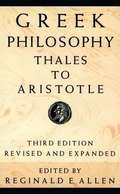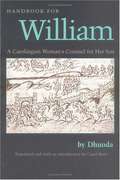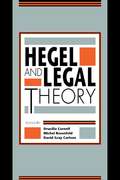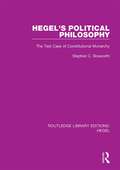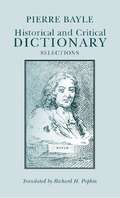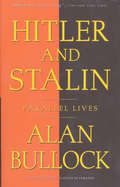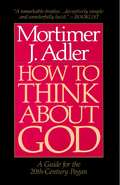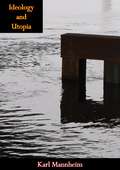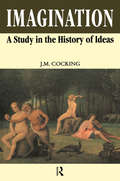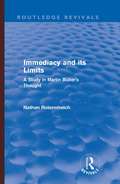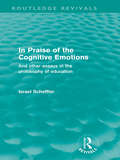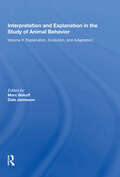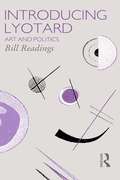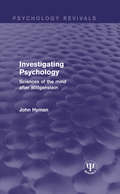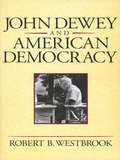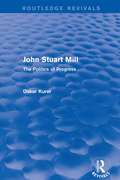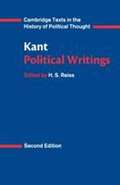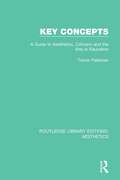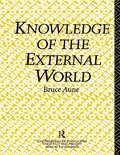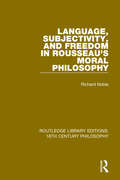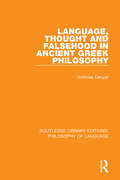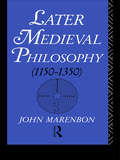- Table View
- List View
Greek Philosophy: Thales to Aristotle (Third Edition)
by Reginald E. AllenEvery history of philosophy begins with Thales, and records with proper solemnity his opinion that the source of all things is water. And every beginning student is shocked. Not until he reaches Plato and Aristotle does he find himself in a world recognizably his own, a world whose science, law, and logic are of a type his own experience has made familiar. The pronouncements of philosophers are usually answers to questions, whether or not the questions are explicitly put. If Thales claimed that the source of all things is water, his question must presumably have been, What is the source of all things?
Handbook For William: A Carolingian Women's Counsel For Her Son (Medieval Texts In Translation Series)
by Dhuoda Carol NeelSo wrote the Frankish noblewoman Dhuoda to her young son William in the middle of the ninth century. Intended as a guide to right conduct, the book was to be shared in time with William's younger brother. Dhuoda's situation was poignant. Her husband, Bernard, the count of Septimania, was away and she was separated from her children. William was by Charles the Bald as a guarantee of his father's loyalty, and the younger son's whereabouts were unknown. As war raged in the crumbling Carolingian Empire, the grieving mother, fearing for the spiritual and physical welfare of her absent sons, began in 841 to write her loving counsel in a handbook. Two years later she sent it to William. Handbook for William memorably expresses Dhuoda's maternal feelings, religious fervor, and learning. In teaching her children how they might flourish in God's eyes, as well as humanity's, Dhuoda reveals the authority of Carolingian women in aristocratic households. She dwells on family relations, social order, the connection between religious and military responsibility, and, always, the central place of Christian devotion in a noble life. One of the few surviving texts written by a woman in the Middle Ages, Dhuoda's Liber manualis was available in only two faulty Latin manuscripts until a third, superior one was discovered in the 1950s. This English translation is based on the 1975 critical edition and French translation by Pierre Riché. Now available for the first time in paperback, it includes an afterword written by Carol Neel that takes into account recent scholarship and the 1991 revised edition of Riché's text.
Hegel and Legal Theory
by Michel Rosenfeld David Gray Carlson Drucilla CornellThe first collection of essays directed towards jurisprudence with a Hegelian theme. The editors are committed to the idea that Hegel is the future source of great energy and insight within the legal academy.
Hegel's Political Philosophy: The Test Case of Constitutional Monarchy
by Stephen C. BosworthOriginally published in 1991, this volume examines Hegel’s political philosophy from the perspective of his argument for constitutional monarchy. It offers an interpretation of Hegelian theory that is relevant for the understanding of modern republican constitutions. Modern republican theories are assessed together with those of Plato, Kant and Marx in order to put Hegel’s model to the most rigorous test. The arguments are based on fresh analysis of Hegel’s system and on new translations of key passages in Hegel’s text.
Historical and Critical Dictionary: Selections
by Richard H. Popkin Pierre BayleRichard Popkin's meticulous translation--the most complete since the eighteenth century--contains selections from thirty-nine articles, as well as from Bayle's four Clarifications. The bulk of the major articles of philosophical and theological interest--those that influenced Leibniz, Berkeley, Hume, and Voltaire and formed the basis for so many eighteenth-century discussions--are present, including David, Manicheans, Paulicians, Pyrrho, Rorarius, Simonides, Spinoza, and Zeno of Elea.
Hitler and Stalin: Parallel Lives
by Alan BullockForty years after his Hitler: A Study in Tyranny set a standard for scholarship of the Nazi era, Lord Alan Bullock gives readers a breathtakingly accomplished dual biography that places Adolf Hitler's origins, personality, career, and legacy alongside those of Joseph Stalin--his implacable antagonist and moral mirror image.
How to Think About God: A Guide for the 20th-Century Pagan
by Mortimer J. AdlerDr. Adler, in his discussion, extends and modernizes the argument for the existence of God developed by Aristotle and Aquinas. Without relying on faith, mysticism, or science (none of which, according to Dr. Adler, can prove or disprove the existence of God), he uses a rationalist argument to lead the reader to a point where he or she can see that the existence of God is not necessarily dependent upon a suspension of disbelief. Dr. Adler provides a nondogmatic exposition of the principles behind the belief that God, or some other supernatural cause, has to exist in some form. Through concise and lucid arguments, Dr. Adler shapes a highly emotional and often erratic conception of God into a credible and understandable concept for the lay person.
Ideology and Utopia: An Introduction To The Sociology Of Knowledge (Routledge Classics In Sociology Ser.)
by Karl MannheimThis book is concerned with the problem of how men actually think. The aim of these studies is to investigate not how thinking appears in textbooks on logic, but how it really functions in public life and in politics as an instrument of collective action.Philosophers have too long concerned themselves with their own thinking. When they wrote of thought, they had in mind primarily their own history, the history of philosophy, or quite special fields of knowledge such as mathematics or physics. This type of thinking is applicable only under quite special circumstances, and what can be learned by analysing it is not directly transferable to other spheres of life. Even when it is applicable, it refers only to a specific dimension of existence which does not suffice for living human beings who are seeking to comprehend and to mould their world.Meanwhile, acting men have, for better or for worse, proceeded to develop a variety of methods for the experiential and intellectual penetration of the world in which they live, which have never been analysed with the same precision as the so-called exact modes of knowing. When, however, any human activity continues over a long period without being subjected to intellectual control or criticism, it tends to get out of hand.
Imagination: A Study in the History of Ideas
by John Cocking"First Published in 1991, Routledge is an imprint of Taylor & Francis, an informa company."
Immediacy and its Limits: A Study in Martin Buber's Thought (Routledge Revivals)
by Nathan RotenstreichOriginally published in 1991, this book focuses on a major problem in the philosophy of Martin Buber. This is the topic of immediacy which is presented in terms of the contact between human beings on the one hand, and man and God on the other. The basic theme throughout is whether the I-Thou relation refers to immediate contact between human beings, as Buber saw it, or whether that relation is something established or aspired to. This is an important study which should be consulted in any future discussion of Martin Buber’s thought. At the same time, it raises critical issues for recent European philosophy. Students of philosophy, and religious and social thought will find its critical exposition extremely helpful.
In Praise of the Cognitive Emotions: And Other Essays in the Philosophy of Education (Routledge Revivals)
by Israel SchefflerFirst published in 1991, In Praise of Cognitive Emotions comprises fourteen of Scheffler's most recent essays – all of which challenge contemporary notions of education and rationality. While defending the ideal of rationality, he insists that rationality not be identified with a mental faculty or a mechanism of inference but taken rather as the capactity to grasp principles and purposes and to evaluate them in the light of relevant reasons. Examining a broad range of issues – from computers in school to math education, from metaphor to morality – these essays are unified by Scheffler's conviction of the primacy of critical thought in education. Scheffler is especially concerned to promote a broad interpretation of rationality to counteract the narrowing of vision accompanying the technological revolution now sweeping education. Addressing three specific areas of curriculum, the work offers a critique of computer applications to education, develops a notion of strategic rationality in understanding mathematical reasoning, and, contrary to prevalent notions of moral education, connects reason with care, thus emphasizing the intimate connection between emotion and reason and challenging the dominant perception of the two as oppositional.
Interpretation And Explanation In The Study Of Animal Behavior: Volume I, Interpretation, Intentionality, And Communication
by Ph.D. BekoffPeople have long been fascinated, not just by the behaviour of non-human animals, but by the problem of how this behaviour is to be interpreted and explained. This is one of two volumes of original essays on the cognitive and emotional dimensions of non-human minds and the relationship of natural minds to behaviour. The essays also address questions concerning the meaning and significance of consciousness; animal intelligence, awareness and emotions; behavioural plasticity, flexibility and constraints on understanding animal minds; and the structure of explanation in the study of behaviour.
Introducing Lyotard: Art and Politics (Critics of the Twentieth Century)
by Bill ReadingsThe first truly introductory text on Lyotard, this book situates Lyotard's interventions in the postmodern debate in the wider context of his rethinking of the politics of representation. Bill Readings examines Lyotard's relationship to structuralism, Marxism and semiotics, and contrasts his work with the literary deconstruction of Paul de Man; he positions Lyotard's work so as to draw out the implications of poststructurlaism's attention to difference in reading. Lyotard's willingness to question the political and examine the relationship between art and politics is shown to undermine the charge that deconstruction abdicates political and social articulation.
Investigating Psychology: Sciences of the Mind After Wittgenstein (Psychology Revivals)
by John HymanOriginally published in 1991, the essays in this volume are written by philosophers who were convinced that Wittgenstein’s investigations in philosophical psychology were of direct relevance to current experimental psychology at the time. Rather than reflecting on the nature of psychological theory at a high level of abstraction, they examined leading theories and controversies in the experimental study of vision and of language in order to reveal the conceptual problems that they raise and the philosophical theories that have exerted an influence upon them. Under the section headings ‘Language and Behaviour’ and ‘Perception and Representation’, the essays examine the work of Chomsky, Gregory, Marr, Weiskrantz and others, and discuss problems ranging from artificial intelligence to animal communications, from blindsight to machine vision. The collection aims to demonstrate that philosophical investigations can contribute to psychological science by extirpating conceptual confusions which have been woven into the fabric of empirical research. The majority of the essays had been specially commissioned, and the contributors include several of the most distinguished exponents of Wittgenstein’s philosophical legacy at the time.
John Dewey and American Democracy
by Robert B. WestbrookOver a career spanning American history from the 1880s to the 1950s, John Dewey sought not only to forge a persuasive argument for his conviction that "democracy is freedom" but also to realize his democratic ideals through political activism. Widely considered modern America's most important philosopher, Dewey made his views known both through his writings and through such controversial episodes as his leadership of educational reform at the turn of the century; his support of American intervention in World War I and his leading role in the Outlawry of War movement after the war; and his participation in both radical and anti-communist politics in the 1930s and 40s. Robert B. Westbrook reconstructs the evolution of Dewey's thought and practice in this masterful intellectual biography, combining readings of his major works with an engaging account of key chapters in his activism. Westbrook pays particular attention to the impact upon Dewey of conversations and debates with contemporaries from William James and Reinhold Niebuhr to Jane Addams and Leon Trotsky. Countering prevailing interpretations of Dewey's contribution to the ideology of American liberalism, he discovers a more unorthodox Dewey--a deviant within the liberal community who was steadily radicalized by his profound faith in participatory democracy. Anyone concerned with the nature of democracy and the future of liberalism in America--including educators, moral and social philosophers, social scientists, political theorists, and intellectual and cultural historians--will find John Dewey and American Democracy indispensable reading.
John Stuart Mill (Routledge Revivals): The Politics of Progress
by Oskar KurerFirst published in 1991, this book attempts to deal with Mill’s thought as a coherent system and tie some elements of his thoughts together. It seeks to show that he developed a set of ethical principles to underlie government intervention and provide a theory as to how it should intervene — which he then applied to practical politics. The first chapters deal with Mill’s doctrine of improvement and what impact the improvement of man has on the social organisation of society. The third chapter deals with Mill’s theory of economic development. The second part of the book deals with policy issues such as the question of the optimal constitution and Mill’s policy proposals for England.
KANT Political Writings
by Hans ReissThis edition includes two important texts illustrating Kants's view of history along with notes and a comprehensive bibliography.
Kant: Political Writings (2nd, Enlarged Edition)
by Immanuel Kant H. B. NisbetThe original edition of Kant: Political Writings was first published in 1970, and has long been established as the principal English-language edition of this important body of writing. In this new, expanded edition two important texts illustrating Kant's view of history are included for the first time, his reviews of Herder's Ideas on the Philosophy of the History of Mankind and Conjectures on the Beginning of Human History, as well as the essay What is Orientation in Thinking'. In addition to a general introduction assessing Kant's political thought in terms of his fundamental principles of politics, this edition also contains such useful student aids as notes on the texts, a comprehensive bibliography and a new postscript, looking at some of the principal issues in Kantian scholarship that have arisen since the first edition.
Key Concepts: A Guide to Aesthetics, Criticism and the Arts in Education (Routledge Library Editions: Aesthetics #5)
by Trevor PatemanFirst published in 1991. The arts can only thrive in a culture where there is conversation about them. This is particularly true of the arts in an education context. Yet often the discussion is poor because we do not have the necessary concepts for the elaboration of our aesthetic responses, or sufficient familiarity with the contending schools of interpretation. The aim of Key Concepts is to engender a broad and informed conversation about the arts. By means of over sixty alphabetically ordered essays, the author offers a map of aesthetics, critical theory and the arts in education. The essays are both informative and argumentative, with cross-references, a supporting bibliography and suggestions for further reading.
Knowledge of the External World (Problems of Philosophy)
by Bruce AuneMany philosophers believe that the traditional problem of our knowledge of the external world was dissolved by Wittgestein and others. They argue that it was not really a problem - just a linguistic `confusion' that did not actually require a solution. Bruce Aune argues that they are wrong. He casts doubt on the generally accepted reasons for putting the problem aside and proposes an entirely new approach. By considering the history of the problem from Descartes to Kant, Aune shows that analogous arguments create difficulties for the contemporary philosophical consensus. He makes it clear that the problem remains acute, particualarly for our understanding of scientific evidence. The solution he proposes draws upon contemporary philosophy of science and probability theory.
Language, Subjectivity, and Freedom in Rousseau's Moral Philosophy (Routledge Library Editions: 18th Century Philosophy #10)
by Richard NobleThis book, first published in 1991, has two related goals. The first is to explicate Rousseau’s conception of subjectivity; the second is to trace the influence of that conception on his theory of freedom. It argues that Rousseau’s conception of subjectivity provides us with a basis for understanding both his analysis of the ‘social problem’ of advanced civil societies, and the solutions he proposes to this problem.
Language, Thought and Falsehood in Ancient Greek Philosophy
by Nicholas DenyerThis book, originally published in 1991, sets forth the assumptions about thought and language that made falsehood seem so problematic to Plato and his contemporaries, and expounds the solution that Plato finally reached in the Sophist. Free from untranslated Greek, the book is accessible to all studying ancient Greek philosophy. As a well-documented case study of a definitive advance in logic, metaphysics and epistemology, the book will also appeal to philosophers generally.
Later Medieval Philosophy: An Introduction
by John MarenbonFirst published in 1991. Routledge is an imprint of Taylor & Francis, an informa company.
Letters to Sartre
by Simone De Beauvoir Quintin HoareLetters written by Simone de Beauvoir to one of the world's most acclaimed philosophers shed light on their relationship and her obsessive need to communicate with him.
Leviathan
by Richard Tuck Thomas HobbesThomas Hobbes' Leviathan is arguably the greatest piece of political philosophy written in the English language. Written in a time of great political turmoil (Hobbes' life spanned the reign of Charles I, the Civil Wars, the Commonwealth and the Protectorate, and the Restoration), Leviathan is an argument for obedience to authority grounded in an analysis of human nature. Since its first publication in 1991 Richard Tuck's edition of Leviathan has been recognised as the single most accurate and authoritative text, and for this revised edition Professor Tuck has provided a much amplified and expanded introduction, which will provide students unfamiliar with Hobbes with a cogent and accessible introduction to this most challenging of texts. Other vital aids to study include an extensive guide to further reading, a note on textual matters, a chronology of important events and brief biographies of important persons mentioned in Hobbes' text.
